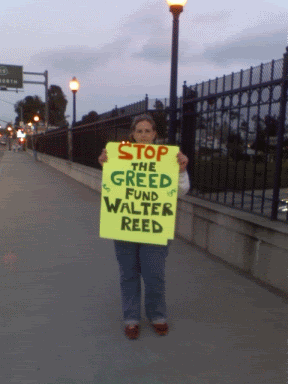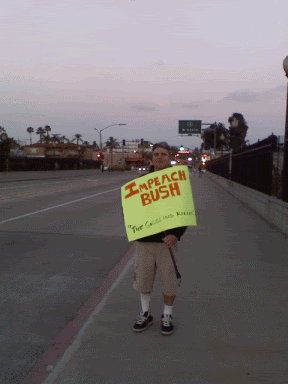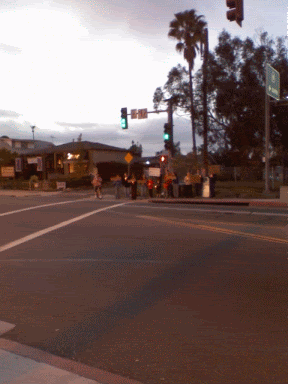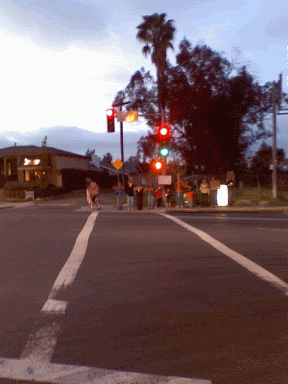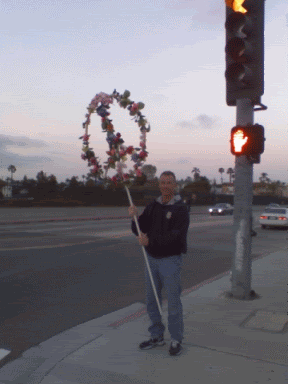Updated: Original title: Netroots 101 for Democratic Women of the Desert
By request of Sandra Stone, president of Democratic Women of the Desert, and George Zander, president of Desert Stonewall Democrats, I took my fellow Democrats down the rabbit hole with me. Many of our best Democratic activists here in the desert are still unfamiliar with a lot about the blogosphere, and I hope to bridge the gap a bit. Word got around after Howie Klein’s visit with Democrats of the Desert last May. These are politically savvy, experienced Democrats who show up, fundraise, canvass, and phonebank. Time to join forces more effectively. I want them in here.
I’ve pulled some notes together and collected pertinent links. The goal is more Democrats from the CA-45th active in the blogosphere. Follow below the flip for the working outline of Netroots 101, a friendly introduction to the blogosphere:
Crossposted to Calitics
Netroots 101 – An introduction to the liberal blogosphere
Short version: Read TalkingPointsMemo, DailyKos and Calitics (links below), and be an online advocate for your community. It’s really, really fun in here, and worthwhile for any citizen.
“Some of you in the DNC may see us as barbarians at the gate. Some of us see ourselves as the cavalry. The truth is, we are fresh horses.” — Miles Kurland, a grassroots DFA activist speaking directly to a large group of DNC members at the DNC Western Regional Caucus, 1/22/05
What is the Netroots Community?
What are blogs? Not necessarily journalism, nor literature, nor punditry. Just free speech on the internet, homespun, in the best American DIY (Do It Yourself) tradition, with all of its potential consequences. And pootie pics and ponies.
Excellent example of campaign blogging: Kid Oakland on why Howie Klein is a netroots hero
Daily Kos & Calitics
Click the sitemeter. Review the blog reader survey.
Structure: Login, Frontpage, Diaries, Comments.
Importance of rules, especially copyright issues, and wisdom of lurking at first.
Daily Kos has an extensive FAQ
Types of Diaries/Posts: Recommended, rated, rescued, campaign round ups.
Getting crossposted, evidence that someone else found merit in your posting. Google always knows. If Calitics front posts your diary, you will be read by the California political media.
Example of a comment on Daily Kos – in this case, I’m adding Mary Bono’s latest gaffe to a posting about astronomic GOP stupidity. Comments in front page postings are more likely to be read than your extensive diary on your candidate. Participate in the conversation, and add your candidate’s POV where it’s pertinent to the conversation. Include a link to the campaign webpage.
Database/Info Mgmt elements of blogs: Links, tags, ratings, trusted user status, hidden comments. Posting is relatively simple on most blogs, with handy buttons to add boldface, italics, links & pics
Community Features:
The Scotty Show, Sunday Talk, BlueAmerica interviews, Cheers & Jeers. Digby Revealed at the Take Back America Conference, June 07. This was the first time her millions of readers got a chance to see or hear the person behind the brilliant words.
Jargon: snark, trolls, concern trolls, flame wars, meta, DFHs, WATBs, WTF?
wingnuts/moonbats, Sockpuppets (Lee Siegal example) Bwahahahaha.
For your reference, the Lexicon of Liberal Invective.
Netroots ethos: Transparency is mandatory, though real names are not. Why.
Commenting Policy for Crooks and Liars
The Debased Mainstream Media – now part of the Beltway elite, often worse than useless
Media Matters, working the refs, corporate takeover, stenography
The Deborah Howell re Abramoff Affair, Judy Miller, Broder, Klein, Hiatt, Tweety, Timmeh. Cocktail weenies. HuffPost’s Russert watch. We want professional journalism, and we react to bad work. Remedies applied:
*Firedoglake and the Libby Trial Legal expertise, and giving a damn about outing a spy made the difference.
*TPM and the US Attorneys issue – Having some regard for the role of the Justice Dept. made the difference. Document dump teamwork.
NB: You will be held to the same standards when you post a diary or comment. Expect feedback on style and substance. Do Not expect it to be uniformly flattering.
Flip side: The netroots give proper support and attention to writers like Paul Krugman, Frank Rich, Sy Hersh, Dana Priest, Dan Froomkin, Murray Waas, Jon Stewart, Stephen Colbert, etc. We have their backs.
Issues with Democrats – The DLC’s sticky fingers and why centrists are perceived as tools, not pragmatists, in the current political environment- Buying into RW frames and media fatuousness. Lieberman, the Fox News Democrat, Short Ride Joe. The whole Rahm v. Dean tension. Shrum/Consultants, feh.
Venting: YouTube of Jim Mora, linked in blogs everywhere after the last Iraq funding vote to voice the disgust:
Beloved Democrats – Howard Dean, Russ Feingold, John Conyers, Al Gore, Barbara Boxer (except for CT primary, which just proves that no one rides for free, not even Boxer. Ruthless scrutiny of Democrats, by Democrats.)
Netroots Campaigning – Earning More and Better Democrats
Resources: Progressive Punch, Sunlight Foundation, WaPo Database. Campaign bloggers tell the story of the campaign and coordinate with other Democratic activists online on behalf of their districts. Act Blue. Viral media. Bird-dogging for macaca moments. Pushing back. Thanks to online activism, many races that no one thought were competitive added to our majority: Webb, Tester, McNerney, Hall. Don’t mention it, it was our pleasure.
Will the netroots get behind my guy? Depends. Some parameters:
Blue America (Crooks and Liars, Down With Tyranny and Firedoglake)
Howie Klein: “Blue America doesn’t ask much of our prospective endorsees. On GLBT issues, for example, we don’t ask them to promise to support a gay marriage bill; we just ask them if they will fight for gay equality, even if they have to exhibit some leadership in a tough environment. If they can’t do that, we may still root for them to beat a much worse Republican, but we don’t raise money for them. We expect the candidates we endorse and raise money for to support a woman’s right to choice, to support serious campaign finance reform, to favor serious proposals to end the occupation of Iraq, to support gay equality– and, like I said, to be willing to exercise leadership on difficult issues. I mean, sure, we want candidates who are for the minimum wage and who oppose the dismantling of Social Security, but those should be the easy issues for Democrats”.
Blue Majority (Daily Kos, MyDD, and Swing State Project):
The litmus test
by kos
Wed Aug 03, 2005 at 06:33:01 AM PDT
My candidate litmus test, with edits, from James Powell’s excellent comment on Gilliard’s blog:
*Does candidate ‘distance himself’ from the party and/or its leaders, or is he proud to be a Democrat?
*Does he talk like a bureaucrat or like a regular person?
*Does she make it clear that she opposes Bush and the Republicans?
*Does she back down when the corporate press/media or Republican pundits attack him, or does she stand by her words?
*Does he sleepwalk through the campaign, or does he act like he wants to win?
Notice the complete lack of ideology. And if that bothers you, just remember who would control the committees if Democrats took charge.
Miscellaneous:
Wikipedia. Google basics. Note: YouTube (owned by Google) and its growing influence (Google is competing with MySpace, which Rupert Murdoch just bought.) Pathetic RW spin offs: QubeTV and Conservapedia. Check the blogrolls of writers you like. Follow the links, or you’ll miss the whole point half the time. TalkingPointsMemo is rapidly becoming a daily requirement.
Endnotes
The blogosphere serves to amplify the best of journalism and commentary, and to fill in the gaps. It’s a networking godsend to activists. There is a RW blogosphere, but it has nowhere near our creative energy and has been repeatedly spanked with the facts. Wingnuttia, as it is called, is just another outlet of the Norquist/Rove media machine, it features foot soldiers repeating talking points, monolithic and unified; whereas the liberal netroots challenge orthodoxy and grow from below, collaborating or not, independently.
Sideline: Guns, Germs and Steel analogy:
Why didn’t China conquer the Americas? Why was it Spain? China had one emperor to ask, Europe had multiple royals. Columbus got lucky with the third monarch. A Chinese adventurer had no such option. Similar dynamic here: This is the drawback to total control, it rewards mediocre talent and punishes innovation, and it’s isolating. Again, this is the netroots’ primary complaint of the DLC, its chief weakness and largest similarity to Rove/GOP, this top-down myopia. This is where “the Democratic wing of the Democratic party” is still alive and kicking. Local Democrats are demanding more say.
What was a Dem weakness is a strength here – our cranky, insubordinate, in-house talent pool. The grassroots are successfully re-branding the Democratic Party partly because the internet levels the playing field. Money and access aren’t neutralized by any stretch, but they’re less omnipotent. It’s a start.
Highly Recommended: Crashing the Gate by Markos Moulitzas Zuniga and Jerome Armstrong, and Anatomy of Deceit by Marcy Wheeler
Remember,
• Lurk first, and if you have to think twice about posting that comment, don’t. Not everything has to be expressed in print for global consumption, and there is no taking it back. Revise & extend, yes. Erase, no.
• Real names aren’t necessary, but absolute transparency is. Note your conflicts and associations frankly.
• Follow the rules, cite your sources, and know your facts. Give us a link. We love a link.
• Don’t feed the trolls. If an emotionally stunted creature goes after you, ignore it. Veterans will deal with it.
No law says you ever have to post a thing. The majority doesn’t (I think). I didn’t for over a year at first. But there’s excellent reading in here, and a nourishing fellowship of liberals. Your candidate will benefit from your browsing alone. Some of the writers in here are breathtakingly good. It’s a tonic.
Appendix
Some Handy Hyperlinks (please note – you don’t have to read all this to keep up. Just dKos and Calitics to start will cover quite a lot, as everyone reads everyone else and quotes their favorite bits):
These first three are unfailingly appropriate for genteel eyes and ears:
Hotline’s Blogometer http://blogometer.na…
Dan Froomkin of the WaPo http://www.washingto…
Scott Horton’s No Comment/Harper’s Magazine http://harpers.org/s…
Some profanity may occur (most likely in the comments) but it is usually merited:
Daily Kos http://www.dailykos….
Firedoglake http://www.firedogla…
Down With Tyranny http://downwithtyran…
Crooks and Liars http://www.crooksand…
Hullaballoo http://www.digbysblo…
TalkingPointsMemo: http://www.talkingpo…
Americablog: http://americablog.b…
Atrios: http://atrios.blogsp…
Calitics http://www.calitics….
Hotline on Call http://hotlineblog.n…
Local talent! Elle’s Blog http://www.desertdem…
Glenn Greenwald http://www.salon.com…
Blog Reader Survey http://www.blogads.c…
Daily Kos FAQ http://www.dkosopedi…
Calitics Rules http://www.calitics….
Crooks and Liars Commenting Policy http://www.crooksand…
ActBlue Formatting Guide http://www.actblue.c…
Blue Majority http://www.actblue.c…
Blue America
Firedoglake Archive – Plame
New York Times regarding the Firedoglake Libby Trial Liveblogging http://www.nytimes.c…
Jane Hamsher on Countdown with Keith Olbermann
Matt Stoller of MyDD on what’s wrong with Dem consultants
Gilliard after the 2004 elections
YouTube – Have You Had Enough of Mary Bono?
YouTube Jim Mora, proxy of choice for liberal bloggers after the Iraq funding vote
Now go forth and find your own favorite links!
Updated at 12:20pm Wed. June 13 to add links and some features (Cheers & Jeers, ponies, Lexicon, copyright issues)
Updated for clarity and tidiness on July 6, again on July 14, 2007






